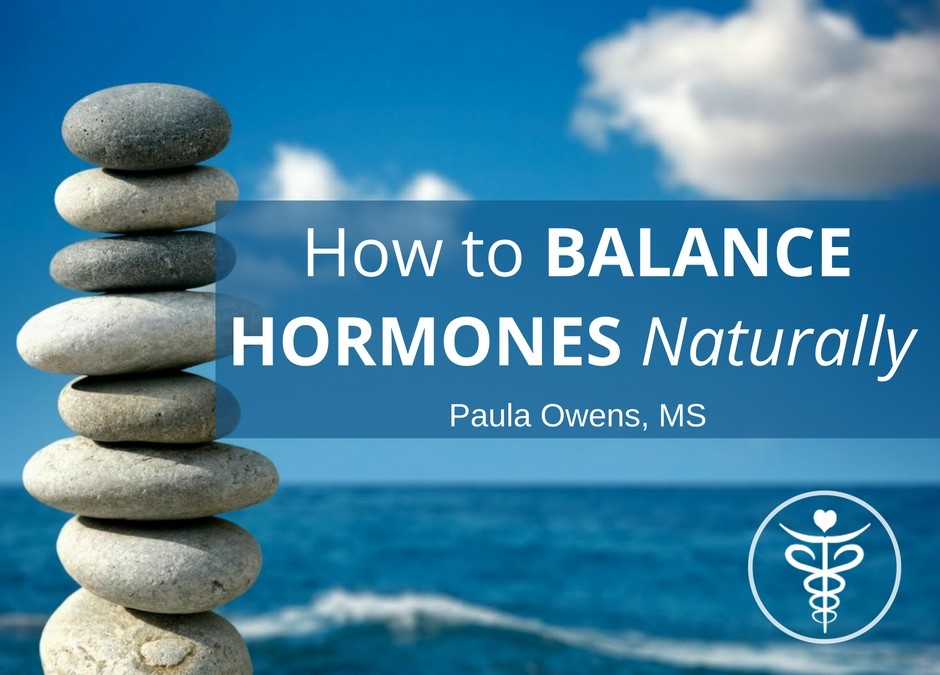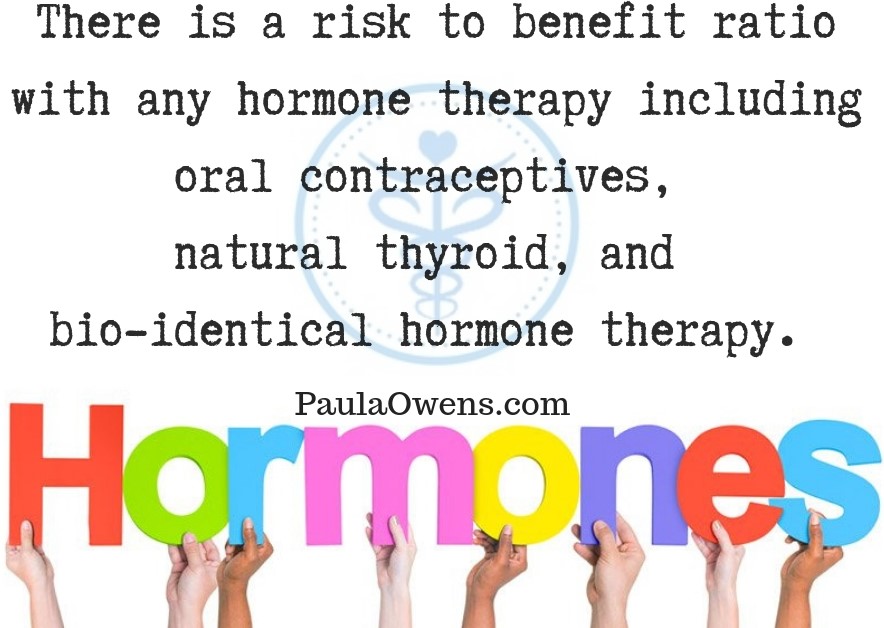Educating and Empowering You to Heal, Thrive, and Live a Happy, Healthy Lifestyle
How to Balance Hormones Naturally
 Hormones are chemical messengers that regulate every physiological process in the body including your metabolism, energy, weight, mood, libido, reproduction, brain function and more. In this article, you’ll learn how you can balance hormones naturally!
Hormones are chemical messengers that regulate every physiological process in the body including your metabolism, energy, weight, mood, libido, reproduction, brain function and more. In this article, you’ll learn how you can balance hormones naturally!
Hormone imbalances affect both men and women, and have a direct impact on how you feel, think and look, your quality of life, relationships, and overall health. It’s important to realize that hormones don’t work in isolation; they do not act independent of one another. If one hormone is out of balance, the other hormones will be affected as well.
When hormones are in sync, we feel energized, we sleep well, perform better, and look, feel and function at our best. When they’re not, we feel miserable.
What causes hormone imbalances? Hormone imbalances can occur from various factors including…
- diets too low in fat, protein malnutrition and eating too many chemically-laden processed frankenfoods
- poor sleep, insomnia
- disrupted circadian rhythm
- sunlight deficiency
- Exposure to artificial light and blue light after sundown
- menopause, peri-menopause, andropause, pregnancy and nursing
- environmental factors, a high toxic load, heavy metal toxicity, exposure to GMOs, pesticides, glyphosate, halogens (fluoride, chloride, bromide), estrogen-mimicking chemicals aka obesogens
- toxic chemicals and an inability to detox properly
- Congested and dysfunctional detox pathways: colon, bowel, kidney, lymph, gallbladder, liver,
- severe dieting, anorexia, bulimia
- dehydration
- adrenal insufficiency, insulin resistance, diabetes, thyroid dysfunction
- chronic stress (which leads to adrenal dysfunction)
- excessive exercise or a sedentary lifestyle
- medical conditions
- birth control pills, hormone therapy, OTC drugs and pharmaceutical medications
- nutrient deficiencies
- infections such as Candida overgrowth, C. diff, yeast, bacterial infections, parasites, SIBO, H.pylori, hidden infections in the mouth
Signs and symptoms linked to hormonal imbalances
Weight loss resistance, insomnia, low libido, fatigue, night sweats, hot flashes, gynectomastia, excess belly fat, erectile dysfunction, hair loss, acne, sugar and carb cravings, digestive issues, fibroids, exercise intolerance, PCOS (increased androgens and increased insulin), diabetes, infertility, premature skin wrinkling, anxiety, mood swings and depression can all be linked to hormone imbalances.
First things first to balance hormones! Build a healthy foundation
Whether a specific hormone is high or low, taking hormones just because lab values are out of range before exploring the root cause can create further hormonal chaos, a metabolic disaster, liver damage, and a potential to disrupt the entire balance. I am not implying that one should never opt for hormones, however it’s important to dig deeper to identify the root causes of the imbalances and find out why your hormones are too high or too low in the first place, and then bring your body into balance naturally, which is not limited to. . .
- various dietary, environment and lifestyle modifications
- use food as medicine, healthier food choices ideal for your bio-individuality
- getting good sleep and a daily dose of sunlight
- healthy detoxification pathways: liver, gallbladder, lymphatics, kidney, bowel and GI function
- address toxic load, obesogen, xenoestrogen, EMF and toxic chemical exposure
- adrenal function, blood sugar fluctuations, sources of inflammation
- nutrient deficiencies and excesses
- healing prior trauma and emotional wounds
- underlying infections, and other systems that directly impact metabolism and hormone function
How to Balance Hormones Naturally
Use Food as Medicine. Food is information that affects metabolism, your genes and the production and secretion of hormones. Food quality matters greatly to balance hormones. It’s important to eat organic, nutrient-dense foods that stabilize blood sugar and cortisol, and increase insulin sensitivity. Instead of limiting or counting calories, support your unique metabolism with a variety of nutrient-dense real foods that support hormone production and balance hormones naturally.
Processed foods, soy, grains, juice, soda, fructose, factory-farmed frankenmeat, low-fat dieting and nutritionally-void insulin-spiking carbohydrates increase blood sugar and negatively impact thyroid function, reduce testosterone production, and change how estrogen is metabolized. It will be nearly impossible to balance hormones if your diet is not a priority for you.
Stay hydrated. The simple habit of drinking enough clean, filtered water (away from mealtime) helps balance hormones. When you’re dehydrated, cortisol increases and testosterone lowers.
Limit exposure to chemicals and reduce toxic load. Obesogens are chemical-hormone disruptors that mimic and alter hormones that inhibit the thyroid, disrupt leptin, decrease testosterone, reduce insulin sensitivity, increase estrogen, increase risk of autoimmune diseases, and negatively affect our health.
Toxic chemicals are everywhere! They’re in food we eat, the water we drink and bathe in, the air we breathe and the products we use in our homes and on our bodies.
Food additives, pesticides, phthalates, xenobiotics, plastics, heavy metals, medications, thermal receipts, plug-in air fresheners, hand sanitizers, flame retardants, cosmetics, personal care and cleaning products, mold and mycotoxins, glyphosate, GMOs, halogens (fluoride, chlorine and bromide), and other environmental toxins and chemicals disrupt hormones, cause mitochrondrial dysfunction, oxidative damage, and increase risk of disease.
Pesticides affect insulin-binding receptors, reduce testosterone, increase estrogen, affect thyroid function and cause other hormone imbalances, increase risk of autoimmune disorders, alter the integrity of the mitochondria, disrupt metabolism, are neurotoxic, and cause numerous health problems. Just one more reason to prioritize organic foods!
Healthy, healing fats are an essential basic building blocks for hormone production. Choose anti-inflammatory fats vs pro-inflammatory frankenfats.
Sleep. Respect your natural circadian rhythms, dampen your stress response during the day, and prioritize 7-9 hours of sleep, which will optimize glucose and melatonin, reduce cortisol, and increase insulin sensitivity, growth hormone and testosterone. Just one week of sleeping <6 hrs/night lowers testosterone by 10-15%, causes leptin-resistance and increases ghrelin, the hunger hormone.
Happy, healthy adrenals. While cortisol is vital to survival as a part of the fight-or-flight response, having chronically high or low cortisol levels result in leaky gut, blood sugar dysregulation, low DHEA, hard-to-get-rid-of belly fat, thyroid dysfunction (interference of T4 to T3 conversion mimicking hypothyroidism), and altered metabolism of sex hormones. If you’re stressed out all the time, not sleeping well, eating garbage and exposed to too many chemicals, you’ll steal progesterone to make cortisol. The adrenal glands are responsible for at least 20-30% of the elevated androgens seen in PCOS. Adrenal insufficiency is the number one hormone imbalance in women.
Meditation, grounding and spending time in nature lower cortisol. Chronically elevated stress hormones disrupt blood sugar, break your body down, damage your mitochondria, negatively impact the nervous system, accelerate aging, increase sugar and carb cravings, and risk of disease. Everything’s interconnected.
Sunlight is an essential nutrient that plays a vital role in immune function, cardiovascular health, and regulating hormones, hunger, mood and metabolism. Our brains need light at the correct time of the day to set our biologic body clock and circadian rhythm.
Gratitude. The simple act of appreciation and gratitude have a positive influence on hormone balance.
Dirty electricity and blue light at night! Reduce exposure from electromagnetic pollution. Never wear a cell phone on your body or carry it in your pocket. Keep smartphones and other electrical devices out of the bedroom during sleep.
Exercise. The traditional approach of more is better is a total metabolic and hormonal disaster. Too much exercise, under-recovery or the wrong type of exercise such as long, slow distance (LSD) steady-state endurance exercise increases cortisol and adrenaline. Instead, choose activities that build you up vs those that break you down. Change the intensity, do less, train smarter, respect rest and recovery, and reap greater results!
Strength training and interval-style, short-burst training such as those found in Fat Loss Revolution balanced with parasympathetic activities that reset your autonomic nervous system (yin yoga, Qi gong, Tai Chi, walking, gardening, rhythmic breathing) is ideal to balancing hormones. Find something you enjoy doing and do it!
A healthy functioning liver is essential for hormone production, detoxification, bile production to aid in digestion and emulsify fats, protein synthesis, correcting estrogen dominance, optimizing thyroid function plus hundreds of other functions.
Cholesterol is required for hormone production. Total cholesterol <160 hinders hormone production. Contrary to what you’ve been told, have read or heard, we need cholesterol…cholesterol is healthy!
Hidden infections. Viral infections such as Esptein-Barr, yeast, fungal, Candida overgrowth, H.pylori, hidden infections in the mouth, SIBO and bacterial infections damage the gut and the brain, cause leaky gut, and damage the adrenals and thyroid, cause autoimmunity, and disturb the delicate balance of hormones.
Less alcohol. Alcohol interferes with hormone function, negatively affecting growth hormone, luteinizing hormone and testosterone production, and increases insulin, cortisol, estrogen and aromatization. Long-term alcohol abuse interferes with the HPA axis, resulting in reduced testosterone and feminization in men.
OTC and Rx drugs interfere with production and balance of hormones. The list includes NSAIDs, cholesterol-lowering statin drugs, opioids, oral contraceptives, anti-depressants, antacids, antibiotics, anti-psychotics, synthetic hormones, chemotherapy drugs, beta blockers, anti-histamines, tranquilizers, anti-fungals, spironolactone and blood-thinning drugs.
Risk to benefit ratio if you’re taking thyroid hormone or any other hormone including bio-identical hormone therapy, I cannot express the importance of monitoring your hormone lab values periodically. Too often the dosing is not monitored. Too much of any hormone is not a good thing, and will create a metabolic disaster, greater hormonal imbalances, liver problems, cause more damage than good over time, and become potentially harmful to your health! Please be responsible and smart!
Taking thyroid medication or any other hormone just because lab values are out of range before exploring the root cause can create further hormonal chaos and problems down the road. I am not implying that one should never opt for hormone therapy, however I look at the root cause, why you’re experiencing hormone imbalances in the first place! Then, bring your body into balance using food as medicine, healing the gut, correcting nutrient deficiencies, addressing toxic load, chemical exposure, your microbiome, sleep, and other lifestyle, diet, mind-body, emotional and environmental habits first. If that fails to bring hormones back into balance, only then should you consider hormones.
Test to assess. The DUTCH Complete is the most comprehensive hormone test. The DUTCH Complete provides an extensive profile of hormones and their metabolites to identify symptoms of hormonal imbalances. The DUTCH Complete is the most accurate test that provides a complete assessment of hormonal health.
Balance hormones with the basic building block nutrients. Zinc, vitamin D, magnesium, digestive support and essential fatty acids. Identify your unique nutrient deficiencies via a blood chemistry analysis.
Set small goals and build upon them to balance hormones. Yes, all of this information can be overwhelming. And, it is just that – information. Change can only happen when the information is applied and followed consistently to where it eventually becomes habitual and part of your lifestyle. Keep it simple! Start with just one or two things that you want to change, develop or improve upon, and commit, dedicate and pour your energy into it. The effort is well worth it as you notice improvements in your mood, behavior, physical appearance, energy, and hormone balance. Small changes add up over time…that’s how life-changing transformation happens! Now, that’s empowering!
Related Articles
- Identify the Root Cause! Test to Assess, Don’t Guess
- How to Reduce Estrogen Dominance
- Hormonal Hazards: GMOs, Pesticides and Glyphosate
- 12 Natural Remedies for a Happy, Healthy Menopause
- 30 Tips to Heal Your Thyroid
- How to Boost Testosterone Naturally
- Video: Could it be your thyroid?


